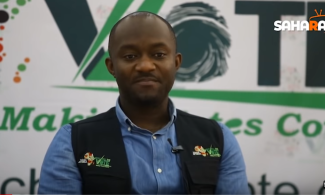
If delayed, he said, INEC might be unable to implement all necessary changes to ensure that the 2023 elections are conducted smoothly.
Convener of the Not Too Young To Run Movement and Executive Director of Election monitoring group YIYAGA Africa, Samson Itodo, says the National Assembly is moving too slowly with returning the electoral amendment to the president for assent.
Itodo told SaharaReporters that the lawmakers have till December to get the bill signed by the president.

If delayed, he said, the Independent National Electoral Commission (INEC) might be unable to implement all necessary changes to ensure that the 2023 elections are conducted smoothly.
"If we want any meaningful reforms between now and 2023, the time to do the reforms is now. These reforms should be completed before December because by then we are already two years to the 2023 elections."
Itodo said that the ninth Assembly had promised to implement the needed changes before December.
He said if the legislators failed to start the process of ensuring the bill becomes law before December, then the country would be moving at a very slow pace towards reforms.
President Muhammadu Buhari refused to give consent to the amendment sent to him before the 2019 elections for three reasons, according to Itodo.
He said some of the changes in the electoral act could have to affect Buhari's chances of winning the presidential election.
He said that the eighth Assembly was viewed as an anti-Buhari legislature, making the president biased towards bills that emanated from it, even though they are of national interest.
Itodo pointed out that the Assembly members had not presented a perfect bill, giving the president an excuse to refuse assent.
Section 52 of the rejected amendment gave INEC the power to carry out electronic voting and any other progressive method it deems fit going forward.
Section 65 of that same bill mandated the commission to create a publicly accessible digital archive of results on a polling unit by polling unit basis.
This would have meant that digitally transmitted results were acceptable as well, stopping the desperation from waylaying returning officers and snatching ballot boxes.
Although INEC is still barred from adopting the digital measures, the commission created an election result portal that allowed registered users view results uploaded at polling units.
Itodo said this innovation made the Edo governorship election more credible.
"The deployment of the result viewing portal is fantastic and is unprecedented in our election process," he said. "What INEC has done is to allow the people to provide oversight on the collation process. The commission also tried to create positive provocation to get the National Assembly to accelerate the amendment of the electoral act."
Although Itodo says the integrity coefficient of the Edo election is higher than any other recent elections in the country, it was still fraught with incidents of vote-buying.
The Independent Corrupt Practice Commission (ICPC) pronounced vote-buying as an act of corruption in 2018 and INEC had proposed a 3-year jail term for persons caught in the act.